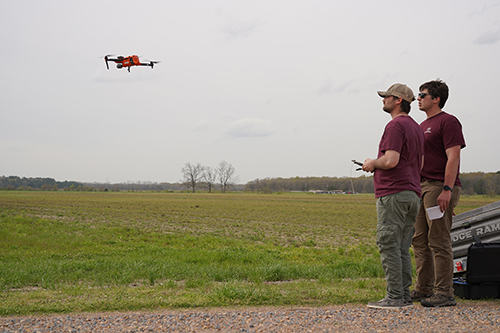Mississippi State’s Raspet Flight Lab, an ASSURE Research Partner, Working with 911 Security to Ensure Safe Drone Use On Campus
In another proactive approach to campus safety, Mississippi State University’s Raspet Flight Research Laboratory is partnering with Dallas-based 911 Security to assist in monitoring drone activity on campus.
The MSU flight lab, which specializes in research and testing of unmanned aircraft systems, known as UAS or drones, signed a cooperative research agreement with 911 Security to implement the company’s AirGuard drone detection system on the Starkville campus.
“There are countless drone uses and operations with great benefits to society,” said Madison Dixon, research director of the Raspet Lab. “The vast majority of these operations are performed safely and responsibly. Still, proactive measures must be taken to prevent reckless, dangerous, or otherwise irresponsible drone operations and to mitigate any safety risks they pose.”
Dixon said no incident prompted the recent agreement.
“MSU is the FAA’s Center of Excellence for UAS and a nationally recognized leader in UAS research,” Dixon said. “Our partnership with 911 Security will optimize UAS operations on MSU’s campus by allowing us to further enable beneficial UAS operations while protecting against unnecessary or invasive UAS operations. We hope this will set a positive example for other organizations and universities to consider.”
911 Security’s AirGuard drone detection system can provide real-time detection and tracking of drone operations within a defined area like MSU’s campus. The system will be used in combination with existing measures, such as the metal detectors at Davis Wade Stadium, to promote campus security during times of peak activity.
The Raspet Lab is currently leading implementation of the AirGuard system and will make recommendations to the MSU UAS Steering Committee, chaired by Raspet Director Tom Brooks, regarding all aspects of UAS operations on campus.
“911 Security is beyond excited to partner with MSU’s Raspet Flight Research Laboratory,” said Jason Reed, with 911 Security. “Drones have become a growing security concern around the world. Our system’s capability of providing real-time location data for drones flying in surrounding airspace can assist law enforcement and security professionals with monitoring these operations. Our goal is ensuring the airspace above our system is safe and secure.”
The university’s unmanned aircraft policy is posted online, and anyone with interest in operating a drone on, above or near campus is encouraged to review it.
MSU’s Raspet Flight Research Laboratory is the nation’s leading academic research center dedicated to the advancement of unmanned aircraft systems. Raspet is the only institute in the world designated both as the Federal Aviation Administration’s UAS Safety Research Facility and as official UAS Test Sites for both the FAA and the Department of Homeland Security. Home to a fleet of the largest and most capable unmanned aircraft in academic use, Raspet conducts UAS research on behalf of federal agencies and commercial industry alike, and it remains a world leader in composite material research.

